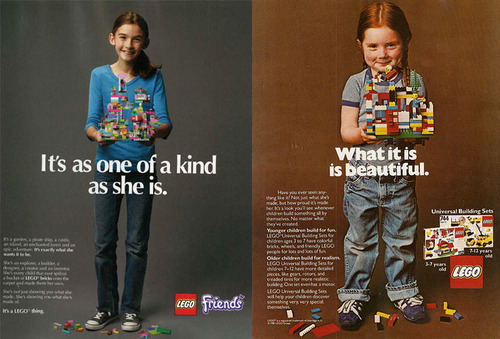Health Promotion Board - “Don’t Toy with Your Life” - Anti-Vape Campaign (2025)
“Don’t Toy with Your Life” is Singapore Health Promotion Board’s newest Vape-Free Campaign for 2025. It aims to


The dust hadn't settled yet from when Goldieblox declared "you gotta fight for your right to infringe" last week - and now Goldieblox have issued a non-apology for infringing Beastie Boys song.
Yesterday Felix Simon joined in opining in GoldieBlox, fair use, and the cult of disruption. Disruption? Yes, we all know that to get angel funders to throw money at you as if you're the last stripper in town, you have to promise disruption. Disruption is changing the status quo by blowing up an old market, and in the new market created a land rush like Oklahoma takes place. Forget those who were on the land before, they need to adapt. Most of all, disruption is really close to douchebaggery if you're not careful. Creating a keyboardless phone that is just a screen in a market full of indestructible Nokias is proper disruption. Picking fights just to get attention is destruction.
But attention in the attention economy is smart marketing. Or so they might have thought - the old adage nothing unsells a bad product faster than good advertising has proven itself again, as people all over and feminist engineers in particular have picked the toy and its concept apart. You know. For science.
Pre 1980s, we grew up on gender-neutral lego and the ads (above) showed us that only our imagination was the limit. To sell new toys today, you have to have a brand bigger than the blox actually used, and so Goldieblox became all girl-power fluff and very little toy. Meanwhile real construction toys like Qubitz aren't seen because attention is a limited resource.
Felix notices that "parodying" the song, and then filing a preemptive lawsuit seems like a plan.
This is faux-naïveté at its worst, deliberately ignoring the fact that Girls, the original song, is itself a parody of machismo rap. The complaint is also look-at-me move, positively daring the Beasties to rise to the bait and enjoin the fight. Which the Beasties, in turn, are trying very hard not to do. In their letter to GoldieBlox, the Beasties make three simple points. They support the creativity of the video, and its message; they’re the defendants in this suit, rather than the people suing anybody; and, most importantly, they have a long-standing policy that no Beastie Boys songs shall ever be used in commercial advertisements. (They don’t mention, although they could, that this last was actually an explicit dying wish of Adam Yauch, a/k/a MCA, and an integral part of his will.)
Given the speed with which the GoldieBlox complaint appeared, indeed, it’s reasonable to assume that they had it in their back pocket all along, ready to whip out the minute anybody from the Beastie Boys, or their record label, so much as inquired about what was going on. The strategy here is to maximize ill-will: don’t ask permission, make no attempt to negotiate in good faith, antagonize the other party as much as possible.
streaming library of music, all the worlds films at your fingertips and so many great things. It has of course all been built on the principle "take first, ask later", so why not advertise the same way? Who needs to ask permission for anyone elses work when they can feed themselves with the attention they'll get. "The [insert popular bad guy] will get the money anyway", people parrot, forgetting that there is no money, except the large chunks funneled into very few peoples pockets. Crowdsourcing designers are churning out cheap logos in Vietnam, working in shifts. Musicians are making pennies for millions of listens, and live in their cars. Journalists write for exposure. Meanwhile in San Francisco, the tech-elite pay for their fair trade latte made on the street where they live in a $3800 one bedroom apartment with a view of the Mission Dolores.
Successful kickstarter campaigns build new companies and launch world tours - for AmandaPalmer, but not for BootsyCollins. Amanda shared her sudden wealth in a tasty compensation package to musicians who played with her on tour: "[I'll] feed you beer, hug/high-five you up and down (pick your poison), give you merch, and thank you mightily." The money that flowed to the top did not trickle down to the musicians at the bottom - and in Bootsy's case where he needed money precisely because he was going to pay the backing band, he got none. Tech names are now shifting how they're perceived as Bittorrent are advertising to change their 'brand' from being synonymous with 'pirating music, films and software' to 'NSA-fighting privacy control and musicians gratis distribution network'. Why? They've disrupted a market, and now they want to claim their piece of Oklahoma in the land rush that followed.
Hmm... I'm noticing a trend here...
The scrappy Goldieblox was hoping to muscle in to the pink aisle of national toy stores, without paying their dues (or indeed paying for licensing). The Google-backed Uber who is muscling in to cities all over the world bypassing established, and costly, taxi regulation. AirB&B figures the whole "tax" thing didn't apply to them. Where did such entitlement begin? Facebook Twitter et al are rather famously not paying taxes when they can avoid it. Taxes that would pay for public schools, public roads et al. Schools that could potentially foster the next generation of girl geeks & engineers, if they weren't near bankruptcy.